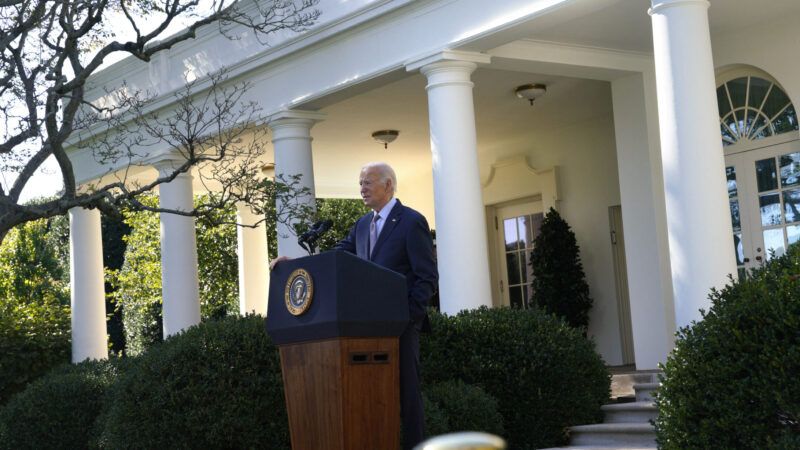Biden Wants Another $56 Billion in 'Emergency' Spending
Congress is being asked to borrow more money to fund broadband access and other pet projects. Only about $9 billion would be spent on natural disaster recovery efforts.

Under the guise of responding to natural disasters, the White House is pushing Congress to approve $56 billion in additional borrowing to fund a wide range of nonemergency spending like broadband internet and humanitarian aid.
Less than half of the $56 billion requested by the Biden administration would be directed toward disaster relief—and only $9 billion would "address ongoing disaster response and recovery efforts," according to a breakdown published by the White House. The majority of the new spending would be aimed at what the White House calls "critical domestic priorities" like welfare programs, the war on drugs, and government-funded broadband internet.
In other words: nonemergency line items that could—and should—be decided as part of the regular budget process, not as a supplemental funding bill.
That would be true even if the federal government weren't already $33 trillion in debt and coming off a year in which it ran a $2 trillion deficit. Yes, another $56 billion in new borrowing and spending is less than 1 percent of the roughly $6.3 trillion the government spent last fiscal year, but we've reached the point where every little bit absolutely matters.
The latest request comes on top of the $16 billion in emergency spending Congress approved in September as part of the short-term continuing resolution (the one keeping the government open through mid-November). It's also in addition to $106 billion in foreign aid for Ukraine, Israel, and other countries that the Biden administration has requested.
If all that gets approved, the $162 billion in "supplemental" new spending will wipe out all the projected savings from the Fiscal Responsibility Act for fiscal year 2024, note Cato Institute budget experts Romina Boccia and Dominik Lett. "Congress should reject phony emergency spending and consider Biden's 'critical needs' request as part of the regular appropriations process, subject to existing spending caps," they write.
Indeed, one has to stretch the term "critical domestic priorities" pretty far to include all the things the White House is asking for.
For example, the Biden administration wants $6 billion in new funding for the Affordable Connectivity Program, which was created as part of the 2021 infrastructure bill and subsidizes low-income Americans' internet bills. However, much of the existing broadband spending in the infrastructure bill has been poorly allocated—wealthy Washington, D.C., got a greater share of the money than any other part of the country, despite the broadband spending being sold as a way to bring faster internet to rural America. And how is it that ongoing subsidies for an existing program count as an emergency—or, for that matter, something that the government should be doing at all?
The same question can be asked of most of the other line items in the White House's supplemental funding request. That includes the $16 billion for child care programs administered by the Department of Health and Human Services, the $2.2 billion meant to improve the Department of Energy's uranium enrichment program, and the $1.6 billion aimed at a program that helps low-income Americans pay their heating bills. There's no reason that these things can't be part of the regular budget process.
The same is true for the proposed $1.55 billion grant program that would help local law enforcement fund anti-fentanyl efforts and the $1.05 billion for foreign food aid. In fact, lawmakers might ask why that last item is included in a list of "domestic" priorities in the first place. (The answer is that foreign food aid programs mostly serve as a way to provide backdoor subsidies to American farmers but are costly and ineffective at actually delivering aid to starving foreigners.)
Certainly, it's possible to make a case for providing funding for each and every one of these line items. But budgeting is about setting priorities, and Congress has done a poor job of that for many years.
With deficits rising and borrowing growing more expensive, lawmakers should be extremely skeptical about hiking spending for the White House's pet projects outside the official budget process.


Show Comments (30)